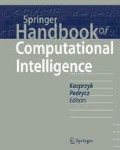Abstract
Basically, this chapter tries to find answers for the following fundamental questions in experimental research.
-
(Q-1)
How can problem instances be generated?
-
(Q-2)
How can experimental results be generalized?
The chapter is structured as follows. Section 56.2 introduces real-world and artificial optimization problems. Algorithms are described in Sect. 56.3. Objective functions and statistical models are introduced in Sect. 56.4; these models take problem and algorithm features into consideration. Section 56.5 presents case studies that illustrate our methodology. The chapter closes with a summary and an outlook.
Access this chapter
Tax calculation will be finalised at checkout
Purchases are for personal use only
Abbreviations
- ANOVA:
-
analysis of variance
- CI:
-
computational intelligence
- EA:
-
evolutionary algorithm
- ES:
-
evolution strategy
- FX:
-
foreign exchange
- i.i.d.:
-
independent, identically distributed
- MAMP:
-
multiple algorithms, multiple problems
- MAMS:
-
multiple algorithms and multiple problem instances
- MASP:
-
multiple algorithms and one single problem
- MSG:
-
max-set of Gaussian landscape generator
- Q–Q:
-
quantile–quantile
- REML:
-
restricted maximum likelihood estimator
- SAMP:
-
one single algorithm and multiple problems
- SASP:
-
one single algorithm and one single problem
- SPOT:
-
sequential parameter optimization toolbox
- US EPA:
-
United States Environmental Protection Agency
References
P.J. Brockwell, R.A. Davis: Introduction to Time Series and Forecasting (Springer, New York 2002)
D.C. Montgomery: Design and Analysis of Experiments (Wiley, New York 2001)
M. Chiarandini, Y. Goegebeur: Mixed models for the analysis of optimization algorithms. In: Experimental Methods for the Analysis of Optimization Algorithms, ed. by T. Bartz-Beielstein, M. Chiarandini, L. Paquete, M. Preuss (Springer, Berlin Heidelberg 2010) pp. 225–264, preliminary version available as Tech. Rep. DMF-2009-07-001 at the The Danish Mathematical Society
C.C. McGeoch: Toward an experimental method for algorithm simulation, INFORMS J. Comput. 8(1), 1–15 (1996)
M. Birattari: On the Estimation of the Expected Performance of a Metaheuristic on a Class of Instances 2004), Tech. Rep. (IRIDIA, Bruxelles 2004)
M. Gallagher, B. Yuan: A general-purpose tunable landscape generator, IEEE Trans. Evol. Comput. 10(5), 590–603 (2006)
I. Castiñeiras, M.D. Cauwer, B. O'Sullivan: Weibull-based benchmarks for bin packing, Lect. Notes Comput. Sci. 7514, 207–222 (2012)
G.E.P. Box, G.M. Jenkins, G.C. Reinsel: Time Series Analysis, Forecasting and Control (Holden-Day, San Francisco 1976)
T. Bartz-Beielstein: Beyond Particular Problem Instances: How to Create Meaningful and Generalizable Results, Tech. Rep. TR 03/2012 (Cologne University of Applied Sciences, 2012)
T. Bartz-Beielstein, M. Friese, B. Naujoks, M. Zaefferer: SPOT applied to non-stochastic optimization problems – An experimental study, Genet. Evol. Comput. Conf. (GECCO 2012) (ACM, Philadelphia 2012)
M. Zaefferer: Optimization and Empirical Analysis of an Event Detection Software for Water Quality Monitoring, Master Thesis (University of Applied Sciences, Cologne 2012)
O. Flasch, T. Bartz-Beielstein, D. Bicker, W. Kantschik, C. von Strachwitz: Results of the GECCO 2011 Industrial Challenge: Optimizing Foreign Exchange Trading Strategies. CIOP Tech. Rep. 10/11, Res. Center CIOP (Cologne University of Applied Science, Cologne 2011)
E. Vladislavleva: Model–based Problem Solving through Symbolic Regression via Pareto Genetic Programming, Ph.D. Thesis (Tilburg University, Tilburg 2008)
H.-G. Beyer, H.-P. Schwefel: Evolution strategies – A comprehensive introduction, Nat. Comput. 1, 3–52 (2002)
H.-P. Schwefel: Numerical Optimization of Computer Models (Wiley, Chichester 1981)
T. Bartz-Beielstein: Experimental Research in Evolutionary Computation – The New Experimentalism, Natural Computing Series (Springer, Berlin, Heidelberg, New York 2006)
T. Bartz-Beielstein, M. Preuss: Automatic and interactive tuning of algorithms, Proc. 13th Annu. Conf. Companion Genet. Evol. Comput. (GECCO) (ACM, New York 2011) pp. 1361–1380
J. Pinheiro, D. Bates: Mixed-Effects Models in S and S-PLUS (Springer, New York 2000)
T. Bartz-Beielstein, M. Zaefferer: A Gentle Introduction to Sequential Parameter Optimization, Tech. Rep. TR 01/2012 CIplus Bd. 1/2012 (Cologne University of Applied Sciences, Cologne 2012)
Author information
Authors and Affiliations
Corresponding author
Editor information
Editors and Affiliations
Rights and permissions
Copyright information
© 2015 Springer-Verlag Berlin Heidelberg
About this chapter
Cite this chapter
Bartz-Beielstein, T. (2015). How to Create Generalizable Results. In: Kacprzyk, J., Pedrycz, W. (eds) Springer Handbook of Computational Intelligence. Springer Handbooks. Springer, Berlin, Heidelberg. https://doi.org/10.1007/978-3-662-43505-2_56
Download citation
DOI: https://doi.org/10.1007/978-3-662-43505-2_56
Publisher Name: Springer, Berlin, Heidelberg
Print ISBN: 978-3-662-43504-5
Online ISBN: 978-3-662-43505-2
eBook Packages: EngineeringEngineering (R0)

